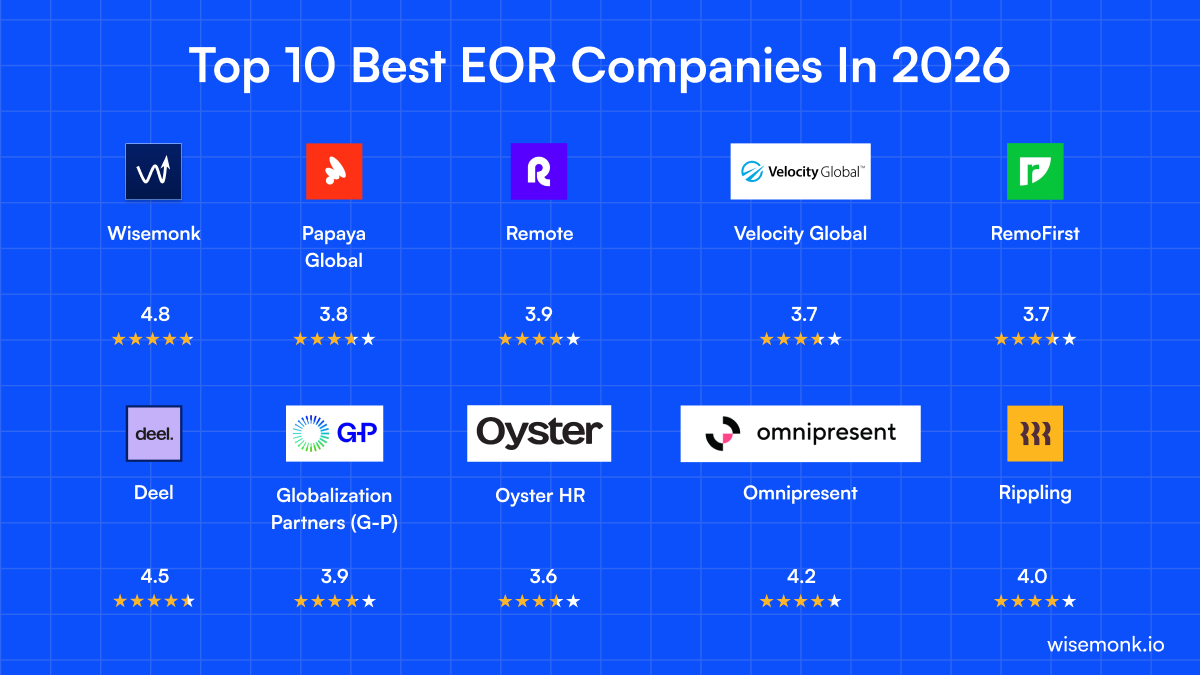Looking to hire employees in China without setting up your own legal entity? Partnering with a China Employer of Record (EOR) lets you tap into China’s massive talent pool, manage compliance with complex local laws, and avoid the time and cost of company formation, all through one streamlined solution. Choosing China EOR services simplifies hiring, ensures you meet every legal requirement, and helps you focus on growing your business in this vital market. In this blog, we’ll walk you through everything you need to know to confidently hire and manage employees in China using EOR solutions.
What are the key employment regulations every foreign company must follow to hire in China?[toc=Employment Law Framework]
China’s employment regulations combine strict legal requirements and detailed government oversight. If you’re hiring employees in China, whether through a legal entity or with an employer of record, you need to pay close attention to the following:
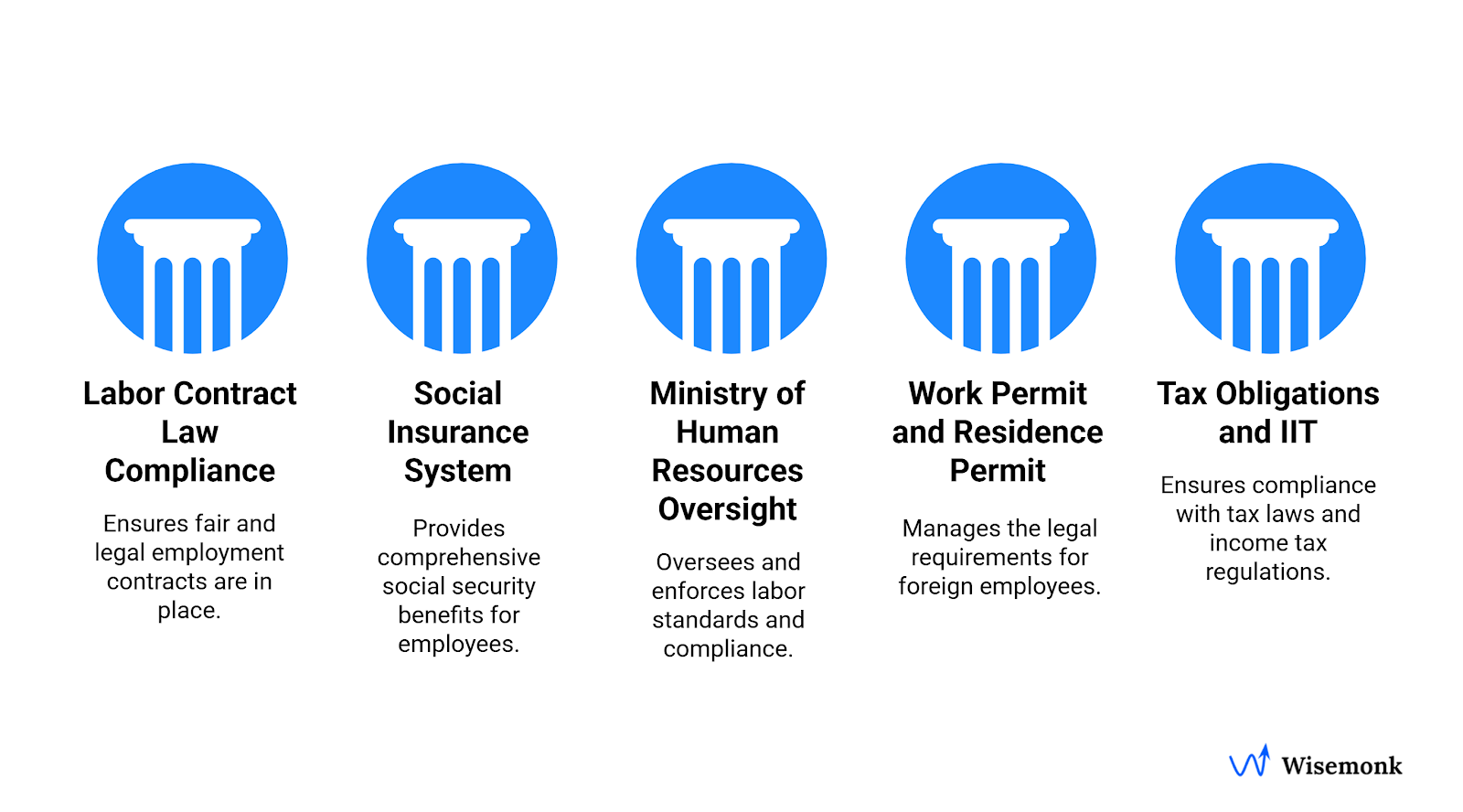
- Labor Contract Law compliance requirements: China’s Labor Contract Law requires every employer to provide a written employment contract within one month, covering terms like probation, working hours, salary, job role, and termination.
- Social insurance system (five insurances, one fund): Both employers and employees must contribute to five types of insurance (pension, medical, unemployment, work injury, maternity) and the housing fund, with rates set by local regulations.
- Ministry of Human Resources oversight: The Ministry of Human Resources and Social Security ensures enforcement of labor standards, payroll management, and correct social insurance contributions across China.
- Work permit and residence permit procedures: Foreign employees need valid work and residence permits, usually a Z Visa, approved with proper contracts and documentation, before they can work legally in China.
- Tax obligations and individual income tax: Employers must withhold and file individual income tax (IIT), ranging from 3% to 45%, for both residents and non-residents, to ensure compliance and avoid penalties.
In our experience helping global businesses hire employees, strict attention to these employment laws and processes is critical for business expansion, workforce stability, and avoiding costly legal issues.
What are the key benefits of using China EOR services?[toc=Key Benefits]
Before you get started, here’s what makes China employer of record services such a game-changer for foreign companies, and why so many businesses, based on our experience, are choosing this route for business expansion.
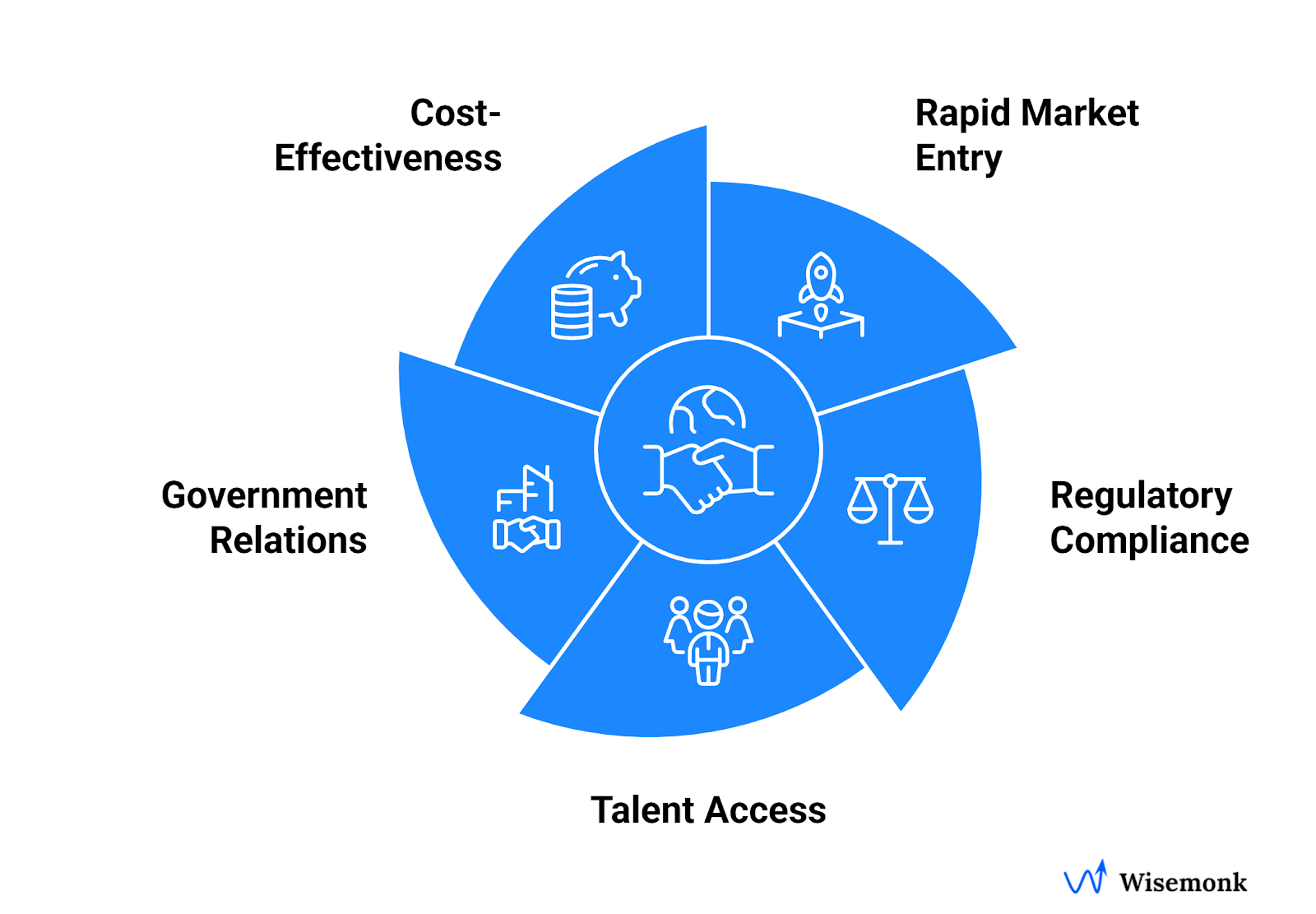
- Rapid China market entry without WFOE setup:
China EOR services let you hire employees in China within days instead of waiting 6–12 months to establish a wholly foreign-owned enterprise (WFOE). No more lengthy registration, local entity paperwork, or bank account delays. It’s the fastest way to be operational and pay employees legally. - Effortless navigation of complex regulations:
With a professional employer organization (PEO) acting as your legal employer, you stay fully compliant with local labor laws, tax laws, social security contributions, and minimum wage standards, no need to decipher the maze of Chinese employment laws or worry about administrative penalties. EOR services handle payroll management, work permits, social insurance, and more, letting you focus on growth. - Access to China’s vast talent market:
EOR providers maintain networks across key cities, unlocking the huge pool of Chinese employees and expat talent. Whether you need remote staff, on-site teams, or specialized roles, an EOR expands your reach and helps you stay competitive in recruiting. - Government relations and compliance expertise:
Having guided multiple global companies, we can say that navigating local regulations and building relationships with government offices in China is critical. EOR partners have on-the-ground HR support and direct lines to relevant Chinese authorities, smoothing audits, work permit approvals, and employment compliance checks. - Cost-effective alternative to entity establishment:
No heavy upfront investment, no ongoing local office lease, no lengthy administrative burdens, just a clean, predictable monthly fee. Multiple sources report that companies can save up to 30% on total HR and hiring costs by skipping WFOE setup and hiring through EOR instead. It’s a flexible, scalable solution that supports business expansion with less risk and lower overhead.
China EOR services are the smartest way to hire employees in China quickly, compliantly, and affordably, without taking on the complexities of establishing your own local entity.
How does a China employer of record (EOR) operate for global companies?[toc=How EOR Operates]
Curious about what happens behind the scenes with a China EOR? Here’s how it works, fast, efficient, and hassle-free, with all the right boxes checked for employment compliance and payroll management.
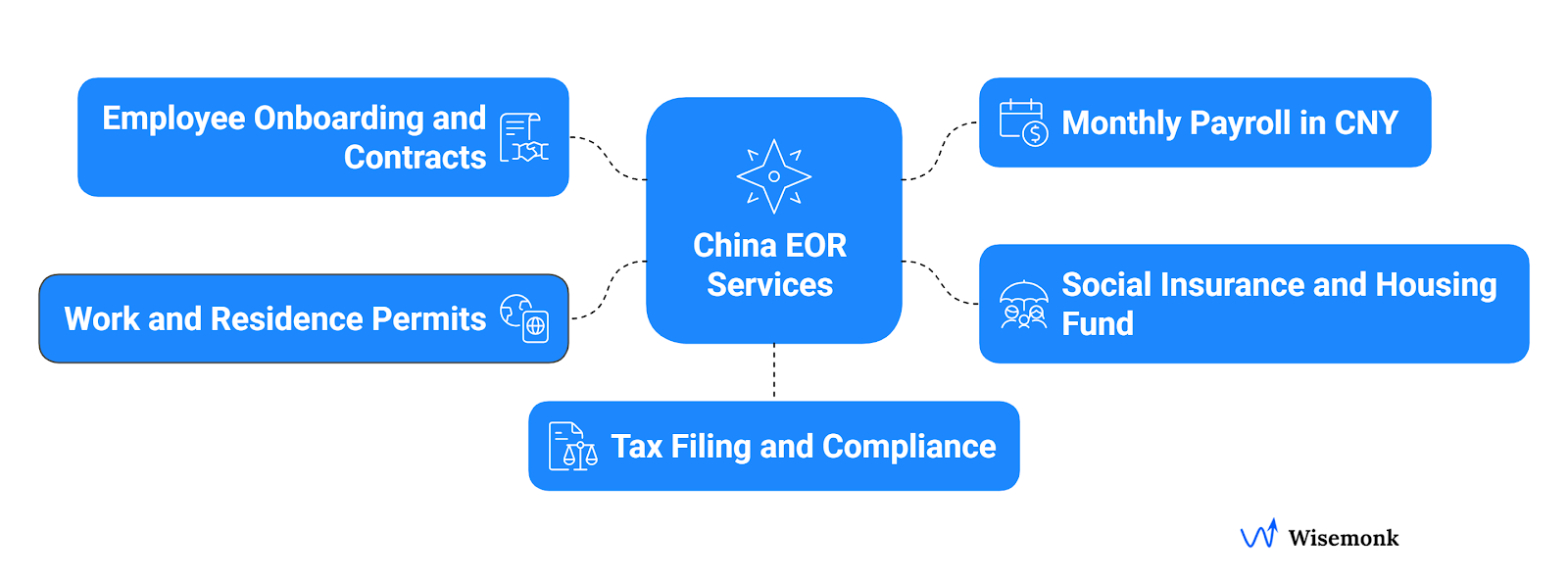
- Employee onboarding and compliant contracts:
The EOR creates bilingual, compliant employment contracts in line with Chinese labor laws, including every required detail, probation period, working hours, employee’s salary, benefits, and termination clauses. They manage all background checks and paperwork, making sure they’re filed with government offices. - Monthly payroll in CNY:
All salaries, overtime, and statutory benefits are calculated and paid in Chinese Yuan (CNY). Payroll management includes tax withholding and strict compliance with social security contributions and minimum wage requirements, keeping every employee paid and records audit-ready. - Social insurance and housing fund contributions:
EOR services enroll each employee for “five insurances and one fund”: pension, medical, unemployment, work injury, maternity, plus mandatory housing fund contributions. This guarantees competitive benefit packages and meets all local labor laws. - Work permit and residence permit for expats:
For foreign employees, the EOR handles work permit and residence permit applications, collecting required documents, submitting to relevant Chinese authorities, and monitoring validity, so employees remain fully legal. - Tax filing and compliance:
The EOR, as the legal employer, manages IIT withholding, files all required taxes, and interacts with the tax bureau on your behalf, ensuring every law and local regulation is met. This shields foreign companies from compliance risks and makes business expansion far smoother.
Using China EOR services means you can hire employees in China, provide full employee benefits, and stay 100% compliant, with no need for your own local entity.
What are the top China-specific EOR considerations foreign companies must know?[toc=Considerastions]
When hiring employees in China through an employer of record, unique local rules require careful attention. Here’s what matters most for compliant, efficient hiring:
- Foreign Expert Certificate & Work Permit: Hiring foreign employees means securing a work permit (sometimes the Foreign Expert Certificate) based on experience, education, and job offer. EOR services handle all documentation, meeting strict Chinese labor laws.
- Social Insurance Contributions: Chinese employees, sometimes including expats, must be enrolled in “five insurances” (pension, medical, unemployment, work injury, maternity). Employers and employees both contribute monthly; rates differ by city. This is critical for covering employee benefits and mandatory for compliance.
- Mandatory Housing Provident Fund: Both EOR and the client company must register staff for China’s housing fund, with typical contributions of 5%–12% from the employer and employee. This supports home purchases for Chinese staff and is enforced locally.
- Individual Income Tax (IIT) & Tax Treaties: IIT applies to both local and qualifying foreign employees. China’s employer of record handles tax filing, withholding, and leverages country-specific tax treaties to prevent double taxation.
- Representative Office vs. WFOE Compliance: A Representative Office can’t directly hire; using a legal EOR is required. Wholly Foreign-Owned Enterprises (WFOE) offer direct hiring, but at a greater cost and complexity. EOR services keep you compliant, no matter your business structure.
From our experience guiding global companies, knowing these China-specific EOR considerations upfront protects you against compliance risks and lets you hire employees in China smoothly, without setting up your own legal entity.
How should you select a China EOR provider for hiring employees in China?[toc=How to Select the Right EOr]
Choosing the right employer of record (EOR) is crucial for compliance and smooth HR operations in China’s challenging business environment. Here are the must-have qualities:
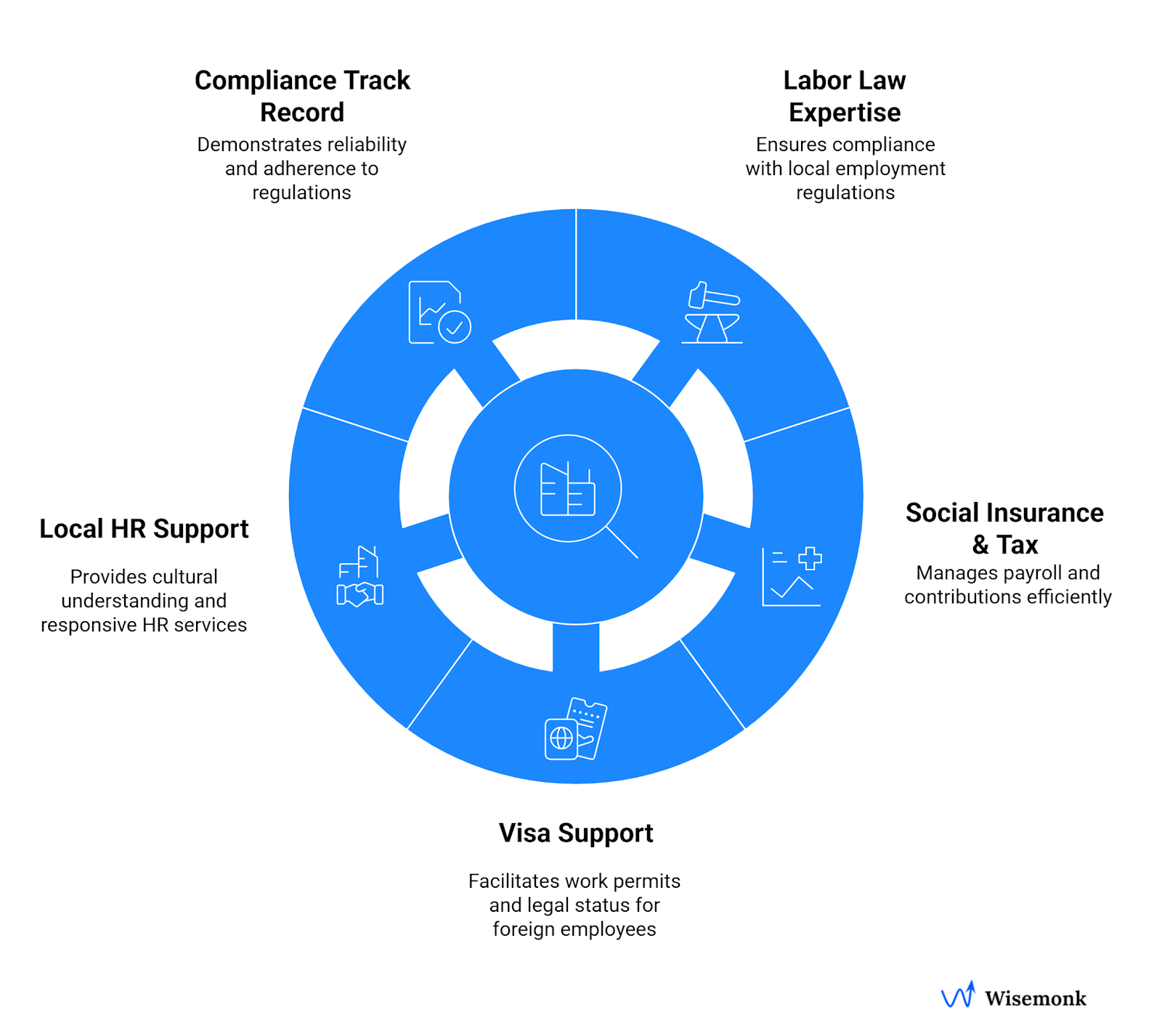
- Chinese labor law expertise and government relations:
Pick a provider who knows local labor contract law, employment regulations, and connects well with government offices, a must for risk-free compliance. - Social insurance and tax administration capabilities:
Your EOR should handle social insurance contributions, housing fund duties, and individual income tax filing seamlessly across multiple regions, ensuring payroll management is always up to standard. - Work permit and visa support services:
Choose an EOR skilled in work permit and residence permit processes for foreign employees, able to manage documentation and maintain legal status with local regulations. - Local HR support and cultural understanding:
Local expertise is vital; select a partner who understands Chinese business culture, manages paid leave, and provides responsive, in-country HR support. - Established presence and compliance track record:
Look for a provider with a strong compliance history and positive client testimonials. Established EORs reduce administrative delays and keep your hiring fully aligned with evolving Chinese employment regulations.
Focusing on these core areas will ensure you hire employees in China smoothly, meet all local labor laws, and expand your business without compliance headaches.
How do China EOR costs compare to setting up a WFOE?[toc=Cost Analysis: EOR Vs WFOE]
Choosing the right hiring method in China hinges on knowing the real costs and speed of setup. Here’s how the two options stack up, highlighting what matters most for expanding your business:
- EOR service pricing ($400–$800 per employee/month):
China employer of record (EOR) services offer a fixed fee per employee, keeping payroll management and HR support costs transparent and predictable each month. - WFOE establishment costs and timeline (6–12 months):
Setting up a wholly foreign-owned enterprise (WFOE) usually costs $15,000–$20,000+ just to get started, and the process takes anywhere from 6–12 months, meaning a long wait before you can hire employees or pay employees legally. - Ongoing compliance and administrative expenses:
WFOEs require continuous compliance, think annual accounting, auditing, tax filings, paying government fees, renting an office, and frequent license renewals. These costs add up fast and never go away. - Professional services and government fees:
You’ll need accountants, consultants, and legal experts for both setup and ongoing operations, driving your annual spending even higher, especially in China’s regulatory environment. - Regulatory complexity and hidden costs:
Many companies face surprise costs and delays after launching a WFOE, from extra audits to sudden regulation shifts, making budgeting unpredictable.
In our experience, EOR services are a cost-effective, low-risk, and faster option for hiring employees in China, letting you avoid upfront investments and the ongoing compliance burden tied to owning your own legal entity. For rapid, agile market entry, EOR is often the best financial and operational choice for foreign employers.
What is the 2025 outlook for China EOR services and employment?[toc=2025 Outlook]
Looking ahead, several key trends are shaping the China EOR market and hiring landscape in 2025:
- Digital economy growth and tech sector expansion: By 2025, digital industries contribute over 10% of China’s GDP, creating strong new demand for skilled Chinese employees in e-commerce, manufacturing, and technology.
- Belt and Road Initiative opportunities: This initiative continues to unlock international trade opportunities, leading multinational companies to rely on China EOR services for compliant, cross-border hiring and payroll management.
- Regulatory changes and foreign investment policies: Recent reforms have eased foreign investment, shortened the negative list, and sped up employment visa issuance, making market entry smoother and compliance more critical.
- Talent competition and salary inflation: Average salary inflation hovers around 5% in 2025. Employers using China employer of record services must benchmark compensation, offer competitive benefit packages, and follow labor contract law to attract the best talent.
- Cross-border e-commerce and manufacturing trends: E-commerce exports are up, and the integration of digital with manufacturing boosts demand for agile, compliant hiring solutions that only a strong EOR provider can deliver.
Understanding these market dynamics helps foreign companies use China employer of record services effectively for compliance, agility, and growth, ensuring you hire employees strategically and stay ahead as China’s market evolves.
Conclusion[toc=Conclusion]
China employer of record (EOR) services give foreign companies speed, compliance, and flexibility to hire employees in China, with no legal entity required. In our experience as leading EOR service provider, EORs streamline payroll management, HR, and employment contracts, all while ensuring adherence to Chinese labor laws, local regulations, and tax obligations.
Using an EOR reduces the risks of non-compliance, labor misclassification, and local penalties by acting as the legal employer. For long-term China strategy, EORs allow companies to scale and test new markets before making bigger investments in a wholly foreign-owned enterprise (WFOE) or joint venture. This flexible model protects resources and guarantees ongoing compliance, even as regulations change.
In summary, China EOR services help foreign businesses hire Chinese employees quickly, minimize market entry risks, and stay focused on business growth in a challenging and competitive landscape.
Ready to expand your global business quickly and compliantly? Partner with Wisemonk’s Employer of Record services to effortlessly manage hiring, payroll, and compliance, so you can focus on growing your business with confidence.
Frequently asked questions
What are the work permit requirements for foreign employees in China through EOR?
Foreign employees need a Z visa, job offer, degree, two years’ experience, clean background, and a medical; the EOR manages work permit and residence permit applications, ensuring all compliance deadlines and onboarding steps are met.
How do social insurance contributions work for expats in China?
Expats with legal work permits are enrolled in China’s social insurance system, covering pension, medical, unemployment, work injury, and maternity insurance, with both employer and employee making monthly contributions based on salary.
What's the difference between using EOR vs. setting up a WFOE in China?
EOR lets you hire employees fast with no local entity, handles HR, payroll, and compliance, while WFOE setup requires significant time, costs, direct management, and ongoing reporting, ideal for long-term, large-scale operations or local invoicing.
Can EOR help with Individual Income Tax optimization in China?
Yes, EOR providers manage IIT filing, optimize allowances (housing, education, etc.), use deductions, and ensure up-to-date compliance with China’s tax laws to maximize take-home pay and minimize tax risk for expats and locals.
How does EOR handle Representative Office employee limitations in China?
Since Representative Offices (RO) can’t hire directly, EOR acts as the legal employer, enabling you to compliantly hire Chinese employees or expats while bypassing the strict four-foreign-staff rule and handling all local compliance.
What is the employer of record in China?
An employer of record is a service provider that acts as an employer for payroll, benefits, compliance with employment laws and regulations, and employee data privacy.
How does EOR work?
While the EOR is the legal employer on record, you still manage the employee’s daily tasks and performance, just as you would with any other team member. The EOR works in the background, taking care of compliance, contract updates, and regulatory obligations to ensure your employment decisions remain risk-free.
-p-1080%201.png)
.png)
%20(1).webp)
